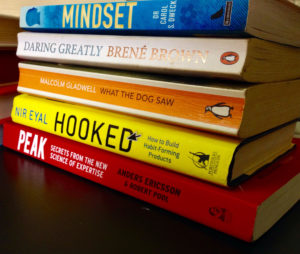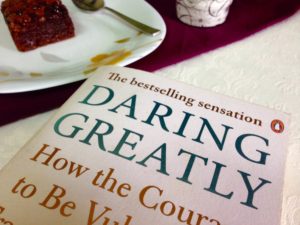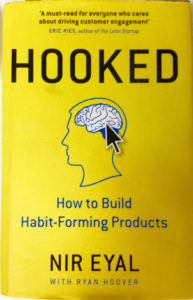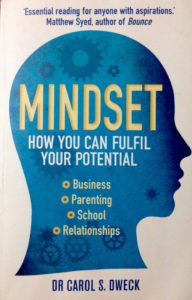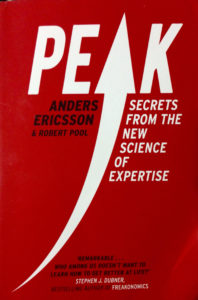To select five best books from my reading repertoire for the year 2016, I had to look back to all the wonderful moments I had with some remarkables books in my creative solitude. Here is a recap to my glorious year of 2016 in terms of reading, and I am delighted to add these books to my lifetime. I learnt a lot, and, trust me, I am not the same person anymore. Yes, I have evolved.
In my life, December-end is the time to recapitulate all the wonderful things I have started or achieved in the entire year. This is my modus operandi. The activity of summarising my work is crucial for my creativity and for the basic fabric of my happiness as it gives me an understanding of the new things I learnt, mistakes I did, and areas of improvement. My consuming desire to learn and grow keeps me focused, energetic, and, most importantly, challenged, and these are the dimensions of my sanity. This analysis takes my conscientious effort; however, the indispensable findings are always worth my time, and they provide me a positive push to carry on the momentum. Year-end is also the time for me to plan my work for the next year, especially the new endeavours or a new journey which I would like to embark upon.
I am an avid reader. The reading practice transcends my mental barriers and compels my brain to outreach the skewed explanations. I have started appreciating my solitude – and not loneliness which has a different meaning – over the years, and wonderful things have happened with me during this time. I have demystified my personality, and I have started to believe that without the period of solitude, we would be unable to inhabit our interior life which is one of the quintessential purposes of our existence. My reading has evolved; it has given me a vital purpose. My collection includes books on psychology and research which illuminate my existing thoughts and give me a push to think beyond the ordinary. I have read some remarkable books in 2016 too; hence, through this recap analysis, I would like to mention five best books which have metamorphosed the way I think and live.
1. What the dog saw by Malcolm Gladwell
Malcolm Gladwell is one of my favourite authors; I have his entire collection. His magnificent research and audacity to question the ordinary make this book a thrilling experience. My first encounter with this author was via his book “David and Goliath” where he mentioned the real and successful stories of remarkable underdogs. He takes us into an excursion to uncover the hidden dynamics about the balance of power between the small and the mighty. The great deal of learning elevated my experience and further propelled me to indulge in his entire collection.
He has been a staff writer for The New Yorker since 1996, and What the Dog Saw comprises of his favourite editorials. His empirical search for knowledge on certain events, theories, diagnosis, pioneers etc. is beyond imagination, and it re-wires your brain circuits to surpass skewed explanations and stereotypes. The book forces you to contemplate different possibilities and unravel the unseen.
It is difficult to select the best editorials from his work as all of them deserve to get mentioned over here; however, to respect the time limit of this article and considering the busy schedules of my valuable readers, I would like to highlight some of the most fascinating ones.
His in-depth analysis of Enron debacle got me interesting in certain aspect of stock markets, and his captivating distinction between a mystery and a puzzle and why the curious case of Enron comes in the former makes this particular editorial a thrilling experience. It was not the secrecy of information that led to the crisis; instead, too much of information and the failure to analyse the detailed information by financial analysts were the two critical factors that gave the label of scandal to Enron.
Another editorial which piqued my curiosity refers to the concept of Late Bloomers. In an era of start-ups and young billionaires where people rave about young achievers, reading about late bloomers, whose talents and capabilities are visible at a much later age than usual, was immensely refreshing. He brilliantly describes that how the act of misjudging late bloomers by considering stereotyping as one of the dimensions of our decision making process is unfair and wrong. Late boomers bloom late, and they do not realize they are good at something until they are 40 or 50.
Read more about Late Bloomers.
I believe what makes Malcolm Gladwell so distinctive is the element of curiosity. His daring attitude to accept something as grey instead of just black or white makes him stand apart in the league of extraordinary.
2. Daring Greatly by Brene Brown
My first encounter with Brene Brown was via a TedTalk where she spoke about the concept of vulnerability. Initially, I found the concept a tad elusive, but once the comprehensibility took over my ambiguity, I welcomed the concept, and its implementation did bring some notable results. Daring greatly epitomizes a decade of research on vulnerability, courage, worthiness, and shame by the author Brene Brown, who is also a research professor at the University of Houston. The book manifests the concept of vulnerability from a different perspective altogether.
What is vulnerability?: As per vocabulary.com, vulnerability is the quality of being easily hurt or attacked; the state of being exposed. For example, the illusionary feeling of standing naked in front of the audience; the state of being open to injury mentally or physically. A majority of people believe that vulnerability is a weakness; manifesting our easy-to-hurt attitude is a sign of shame and a measure of fear. However, our willingness to acknowledge and own our vulnerability is a courageous act and executing an action by accepting our vulnerability shows our strength of leaving our comfort zone and overcoming the fears.
The author describes vulnerability as uncertainty, risk, and emotional exposure, but the biggest strength lies in accepting these things and daring greatly to show up and let ourselves be seen in: a new relationship, an important meeting, a difficult presentation, a speech etc. The more we try to bulletproof our personalities or play safe, the more we deprive ourselves from the life’s greatest and joyful experiences.
“Perfect and bulletproof are seductive, but they do not exist in the human experience. We must walk into the arena, whatever it may be – a difficult family conversation, a new venture, or falling in love – with courage and willingness to engage. Rather than sitting on the sidelines and hurling judgements and advice, we must dare to show up and let ourselves be seen. This is daring greatly.”
“A daring greatly culture is a culture of honest, constructive, and engaged feedback. This is true in organizations, schools, and families. Without feedback, there can be no transformative change. When we do not talk to the people we are leading about their strengths and their opportunities for growth, they begin to question their contributions and our commitments; hence, disengagement follows.”
Daring greatly is a wonderful read. My foray into this book brought back the vivid memories of my corporate stint where the good, bad, and ugly experiences changed my perspective towards the life.
Read full book review.
3. Hooked by Nir Eyal
Gone are the days when a product’s features were solely considered for its success or failure. In this universe of constant flux where the progress of digital media, social network, branding, and constantly changing technology have taken imaginary leaps, companies are now infected with the concept of habit-forming products (I have explained this concept in the next section) which leads to a deep connection between a consumer and its product in a sure-fire way. Nir Eyal’s Hooked exemplifies the combination of exoteric writing style and our impulsive behaviors towards the usage of the products in this contemporary world.
Hooked focuses on the concept of habit-forming products, and it has been brilliantly simplified through real-world examples. In terms of definition, a habit is a behavior done with little or no conscious thoughts, and habit-forming products are those which reach the ultimate goal of unprompted user engagement, bringing users back repeatedly without any expensive advertisement strategies. Please note the word “Unprompted”.
The engagement of the users with the product is so automatic or impulsive that they do not wait for any external trigger such as notifications or alerts. When a product solves a user’s problem or satisfy their discomfort, users are hooked, and the products are associated with their lives.
The quintessential example of a habit-driven product is Google. As a result of the increasing popularity and the extreme dominance of this search engine, the term Google has been awarded the status of a verb. We have shortened the phrase from “Let’s search this on Google” to “let’s Google it”. There are other search engines available which will give you similar results; however, in case you are using Google from a very long time, would you like to switch to any other search engine? May be or may be not. The results given by Yahoo’s Bing are nearly identical, so why haven’t most of the Google users switched to Bing? The simple answer is that Google has become a part of our lives; in short, a habit. Users no longer need to think about whether or not to use Google; they just do. This is a habit-driven behavior resulting in Google’s market domination, and it is almost impossible to alter this behavior because habits keep users loyal.
Read full book review.
4. Mindset by Carol Dweck
If I have to pick a favourite then it has to be Mindset. This book transformed the way I think, work, love, connect and live; it has been an eye opening experience. Mindset is one of those books which has to be read multiple times not because of its elusive content (on the contrary, the content is very simple to comprehend) but due to the great deal of learning from its empirical data and real-world examples. The book manifests the words of wisdom and further unravels that how amidst constant flux of unprofessional work culture, unhealthy peer competitions, bully behaviours etc., a simple change in the mindset can turn the tide. In this book, world-renowned Stanford University psychologist Carol Dweck in her decades of research on achievement, effort, and success demonstrates The Power of our Mindset.
She explains two types of mindsets: Growth Mindset and Fixed oriented mindset.
Teachers, CEOs, athletes, coaches and parents with growth mindset: never give-up, consider failures as opportunities, learn from their mistakes, work very hard by giving 100% in the endeavours, respect others, do not judge or label children, opens the channels of communication, invest time and effort in the development of others, build a strong character etc. A growth mindset creates an environment where success is not defined by winning but by learning and improving. Athletes and coaches with growth mindset do not strongly believe in innate ability or talent but believe fervently in giving 100% in sports. They earn the respect via their endurance and mettle; according to them, it is The Effort which bring victories. Great leaders with growth mindset manifest their ability to open, change, grow, connect with people and understand their perspective.
On the other hand, fixed mindset people are just the opposite. Fixed mindset leaders foster the culture of ego and expects everybody to agree with them. They do not welcome change or new ideas. They feel pride in showing their superiority and power which further fuel their ego. Similarly, fixed mindset involves labeling children and assuming that their learning capabilities are fixed throughout their lives. Fixed mindset does not believe in nurturing the talent and consider all the children alike. When it comes to fixed mindset coaches, they just believe in winning and that’s all. Winning is the most important aspect for them instead of effort or hard work. Parents, too, label their kids in this mindset.
One of the biggest learnings for me was to understand the correct way of praising someone, especially kids. When we say to a kid that he or she could achieve something due to his or her innate ability or talent or gift then we are sending them into a fixed mindset. We are giving them a message that they could achieve this only due to their talent and not because of their effort.
It has several negative cascading effects. Firstly, the kid might not accept any challenges in the future as he or she would like to preserve their label of “Naturally Gifted” and a failure might devoid them of this badge of honour. Secondly, they will be scared of failures, and if they encounter them, they might go into depression thinking that their life is over as they are not naturally gifted any more. Thirdly, they might start believing in the perception that talented kids do not need to work hard and only average or below average kids are meant to put great effort as they are not talented.
We must always praise their effort and hard work. We must create an environment for the kids which nurture their skills and abilities rather than their so-called thought of “Natural ability”.
Carol Dweck did a fantastic comparison between people of different mindsets, and she has provided several illustrations of world famous personalities to provide the evidence. It is truly amazing to note that how a slight change in a mindset from fixed to growth can unravel the mysteries of this complicated world.
5. Peak: Secrets from the new science of expertise By Anders Ericsson
I came across Peak during my very interesting research where I was trying to find an answer whether a natural talent exists or is it all the hard work and effort which take people to the pinnacle of success. In all honesty, I am still reading this book, and it has been a thrilling experience thus far; however, the most astonishing aspect for me was the difference between a practice and a deliberate practice.
The author Anders Ericsson has spent thirty years in studying The Gifted, The Special Ones, The talented, sports stars and other prodigies, and he specifies that their special abilities are acquired by their number of years of effective training. He further mentions:
The innate gift is a myth; exceptional individuals are not born, and they become great by developing their body and brain through intensive and valuable trainings. They just do not practice but perform deliberate practice to reach unattainable heights in their careers.
The author mentions that along with the quantity of practice, the quality also matters a lot. By performing the same action multiple times over a number of years, which is the definition of a normal practice, will not improve the performance; instead, the person will have to define specific goals, find a mentor who can give timely feedback, and have to find different strategies and approaches to achieve the desired result. In a nutshell, this is deliberate practice. When you indulge into some sort of training via a deliberate practice, your brain also responds by developing new abilities.
From London taxi drivers to chess grandmasters, the author has supported his findings via a plethora of real-world examples. The extraordinary achievers were not born this way; instead, they harnessed the adaptability and flexibility of the brain and body to develop abilities that would otherwise be impossible to achieve.
So these are my favourite books of 2016. In all honesty, they have empowered me to look at things from various perspectives. I will again mention that I am not the same person anymore, and I am proud to have implemented most of the learnings in the way I work and live.

